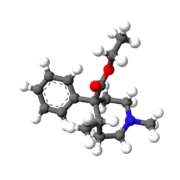Metethoheptazine
Metethoheptazine[1] (WY-535) is an opioid analgesic from the phenazepine family. It was invented in the 1960s.[2]
 | |
 | |
| Clinical data | |
|---|---|
| Other names | WY-535 |
| ATC code |
|
| Identifiers | |
IUPAC name
| |
| CAS Number | |
| PubChem CID | |
| ChemSpider | |
| UNII | |
| Chemical and physical data | |
| Formula | C17H25NO2 |
| Molar mass | 275.392 g·mol−1 |
| 3D model (JSmol) | |
SMILES
| |
InChI
| |
| | |
Metethoheptazine produces similar effects to other opioids, including analgesia, sedation, dizziness and nausea.
Metethoheptazine is not listed as a controlled substance under the Controlled Substances Act 1970 in the United States.[3] The Canadian Controlled Drugs and Substances Act specifically excludes the phenazepine opioids from control.
References
- GB 843924, "Substituted azacycloheptanes", assigned to American Home Products
- Walkenstein SS, Corradino RA, Wiser R, Gudmundsen CH (February 1965). "Metabolism of the Non-Narcotic Analgesic, WY-5355". Biochemical Pharmacology. 14 (2): 121–8. doi:10.1016/0006-2952(65)90067-5. PMID 14332457.
- "Conversion Factors for Controlled Substances". Diversion Control Division. Drug Enforcement Administration, U.S. Department of Justice. Retrieved 8 October 2018.
This article is issued from Wikipedia. The text is licensed under Creative Commons - Attribution - Sharealike. Additional terms may apply for the media files.